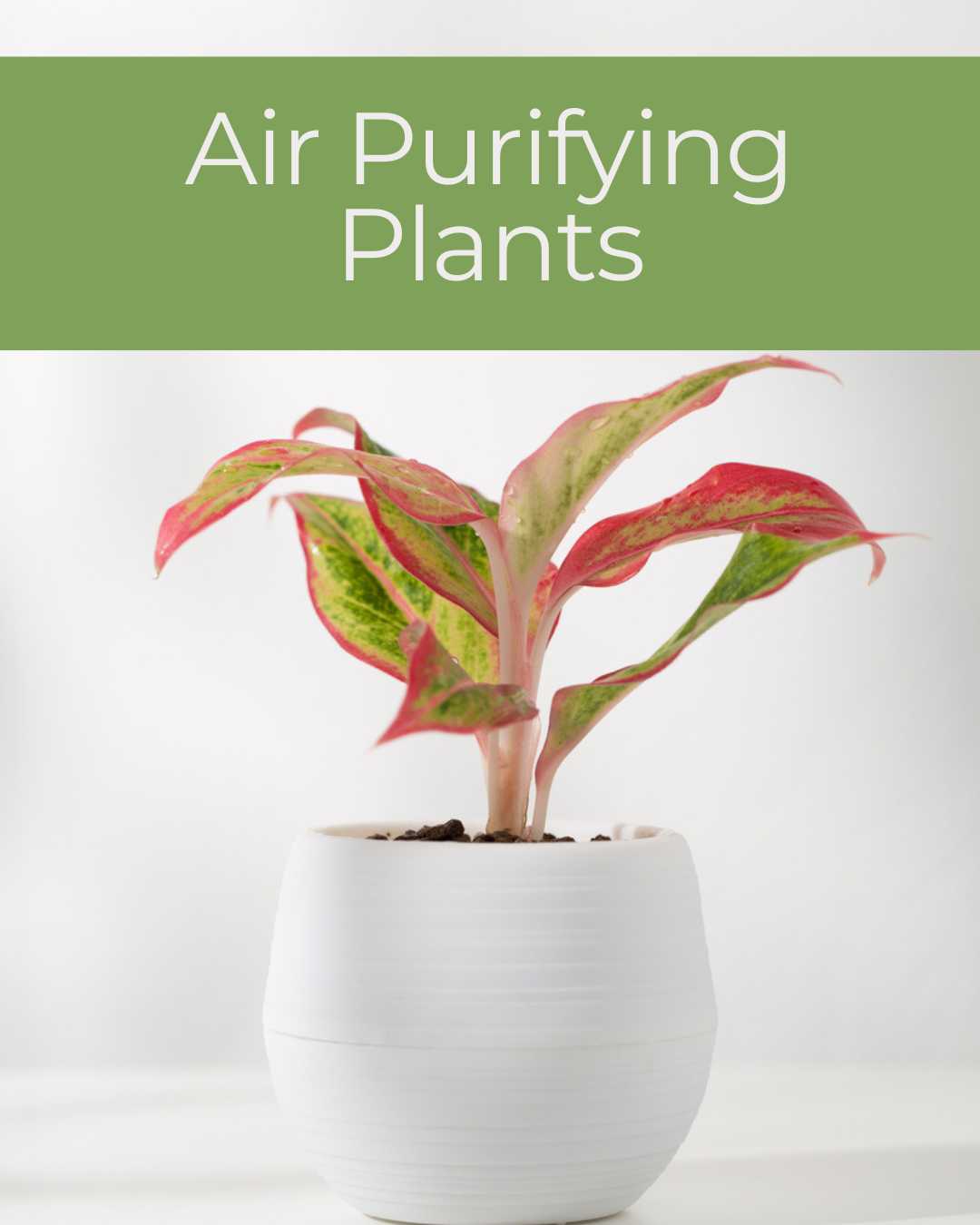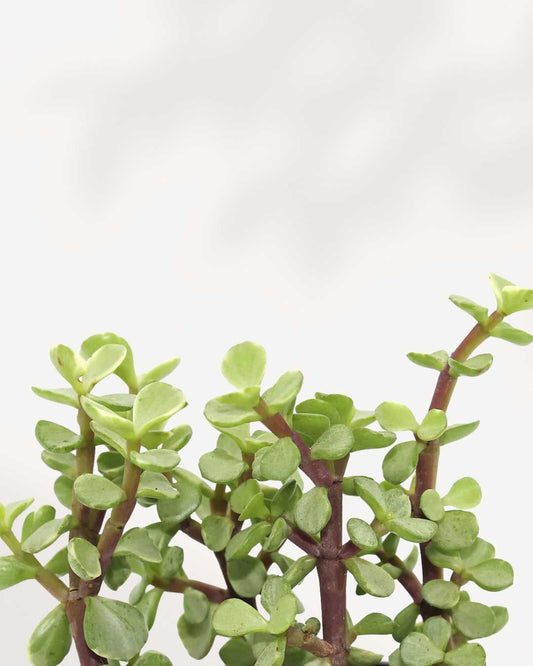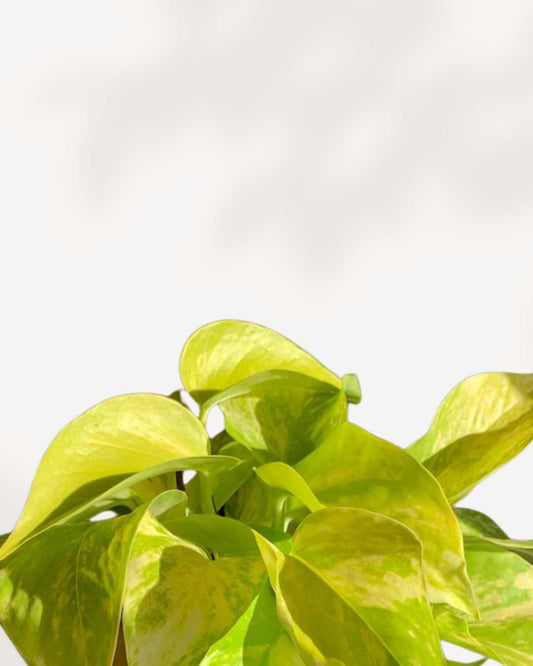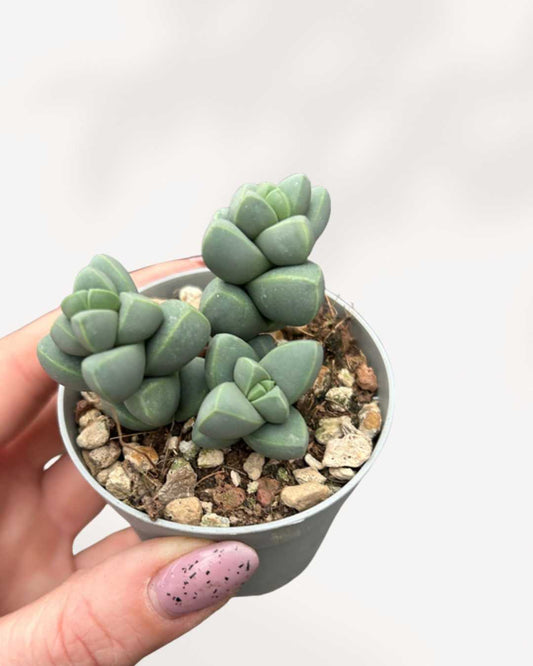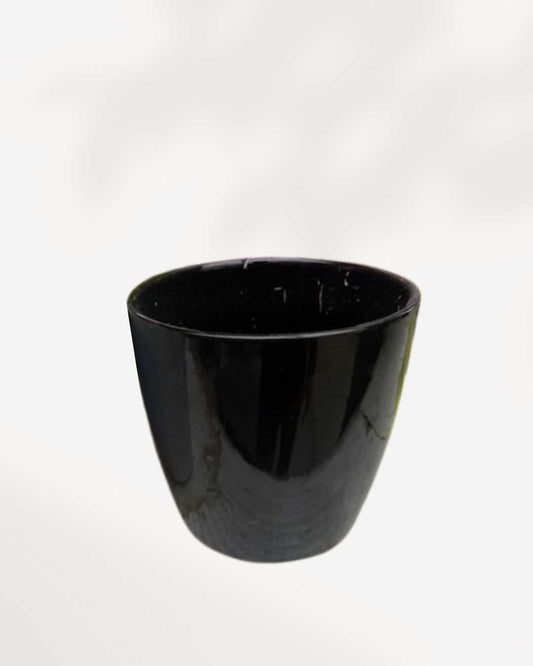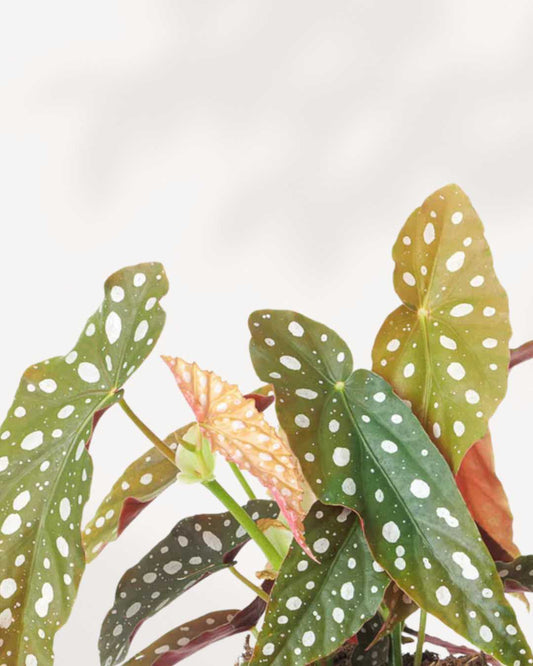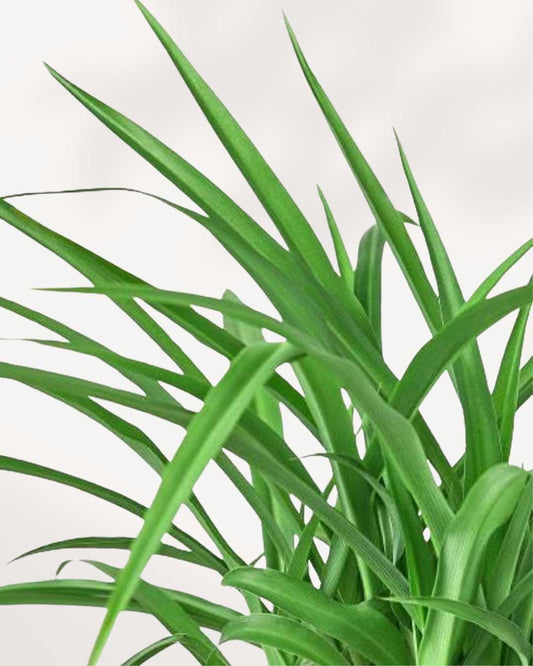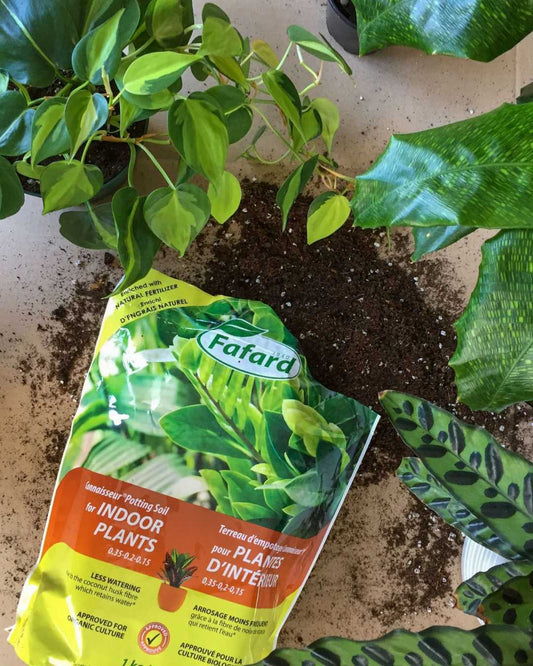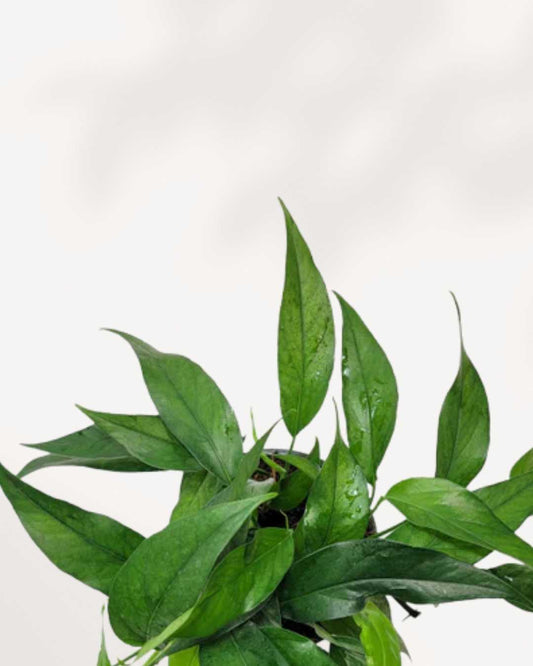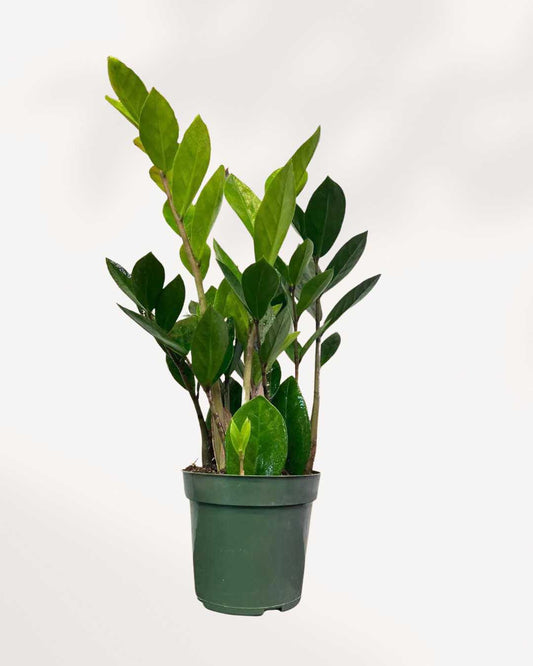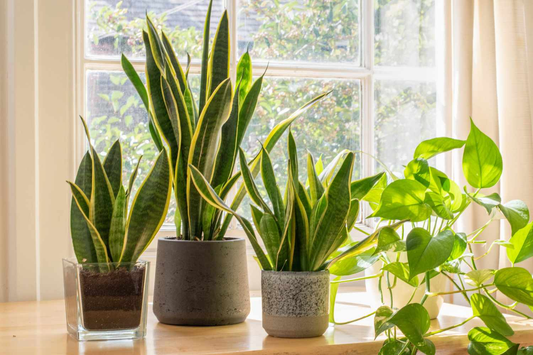How to care for Lithops Living Stones
| Back to Library |
Quick Care Overview
| Care Aspect | Details |
|---|---|
| Light | Bright, indirect sunlight. Avoid intense midday sun. Learn More |
| Water | Water sparingly. Only when the soil is completely dry. |
| Soil | Use a gritty, well-draining cactus or succulent mix. Shop Potting Mix |
| Temperature | 65–80°F (18–27°C). Protect from frost. |
| Toxicity | Non-toxic to pets. |
Lithops (Living Stones) Plant Care Guide | Growing, Watering, and Propagation Tips
Discover how to care for Lithops, also known as Living Stones. Learn about watering, light, soil, and propagation to keep these unique succulents thriving in your home.
Common Names
- Living Stones
- Pebble Plants
- Stone Plants
Native Habitat
Lithops are native to the arid regions of southern Africa, particularly Namibia and South Africa. They thrive in rocky, sandy soils and have adapted to extreme drought conditions.

Uses and Popularity
Lithops are popular for their stone-like appearance, making them a favorite among succulent enthusiasts. They are perfect for small pots, rock gardens, and minimalist indoor displays.
Lithops Plant Care Guide
Light Requirements
Provide bright, indirect sunlight. A south or east-facing window works best. Avoid harsh midday sun that can scorch the plant. Learn more about light requirements.
Watering Needs
Water sparingly. Only water when the soil is completely dry, typically once every few weeks. Avoid watering during their dormant period in winter.
Soil Preferences
Use a fast-draining cactus or succulent potting mix. Adding sand or perlite improves drainage. Shop Potting Mix
Temperature & Humidity
Lithops thrive in warm, dry conditions. Keep them between 65–80°F (18–27°C). They do not tolerate frost or excess humidity.
Fertilization
Fertilize sparingly—only once during the growing season (spring/summer) with a diluted cactus fertilizer. Explore Natural Fertilizers
Pruning & Maintenance
No pruning is required. Remove dried leaves naturally after the plant sheds its old pair. Ensure the plant isn't overwatered to prevent rot.
Propagation Tips
Seeds
Propagate Lithops by sowing seeds in a well-draining mix. Keep the soil lightly moist until germination occurs, which may take several weeks.
Division
Mature Lithops naturally divide, producing new pairs of leaves. These divisions can be carefully separated and replanted.
FAQs
How often should I water Lithops?
Water only when the soil is bone dry, typically once every 3–4 weeks. Do not water during their dormant winter period.
Why are my Lithops splitting?
Splitting is part of their natural growth cycle. Lithops shed old leaves to make way for new ones. Avoid watering during this process.
Can Lithops grow indoors?
Yes! Lithops thrive indoors with bright, indirect light and minimal watering, making them ideal for small spaces.
The Positive Impact of Plants
-
Plants and Healing
Working with plants soothes the mind. It feels calming and healing, offering a peaceful break from daily life.
-
Plants for Recovery
Being around plants can speed up healing from sickness, making you feel better quicker in a natural way.
-
Plants and Work
Plants in your space may make your work better and faster, enhancing focus and creativity during tasks.
LETTING CUSTOMERS SPEAK FOR US!
Shop by Feature
FAQs for Plant Delivery in Ontario & Quebec
What types of house plants do you offer for delivery.
We offer a wide variety of houseplants for delivery. Here are some of the popular options: Aglaonema, Alocasia, Calathea, Hoya, Monstera, Palm, Peperomia, Philodendron, Pothos, Sansevieria Snake, Syngonium, Tradescantia.
What is the lifetime support?
All plants purchased from our store or through our workshops come with lifetime support. This means that whenever you have questions or concerns about your plant, we're here to help. Whether you're unsure about your plant's health or need advice, we can assist in identifying problems, answering your questions, and potentially saving your plant. Feel free to reach out to us on Instagram @mygreenscapeto or via email at support@mygreenscape.ca.
Where do Mygreenscape plants come from?
Our plants embark on a journey from various greenhouses across Canada. We prioritize short delivery routes to ensure your plant arrives happy, healthy, and full of vitality.
Do I have to repot my plants once they arrive?
Absolutely not! When your plant arrives, give it time to settle into its new home. Place it in the desired spot, and let it acclimate for about two weeks.
Favorite in our plant shop
-
Portulacaria afra
Regular price $15Regular priceUnit price per -
Pothos Teruno Kaguya Lemon
Regular price $15Regular priceUnit price per -
Sansevieria Chanin
Regular price $25Regular priceUnit price per -
Sansevieria Yaya
Regular price $25Regular priceUnit price per -
Delosperma Lehmannii
Regular price $10Regular priceUnit price per -
Glossy Ceramic Planter
Regular price $15Regular priceUnit price per$30Sale price $15Sale -
Monstera Yellow Marilyn
Regular price $195Regular priceUnit price per -
Begonia Maculata
Regular price $40Regular priceUnit price per -
Spider Plant Green
Regular price From $10Regular priceUnit price per -
Indoor Plant Potting Mix Connaisseur®
Regular price $12Regular priceUnit price per -

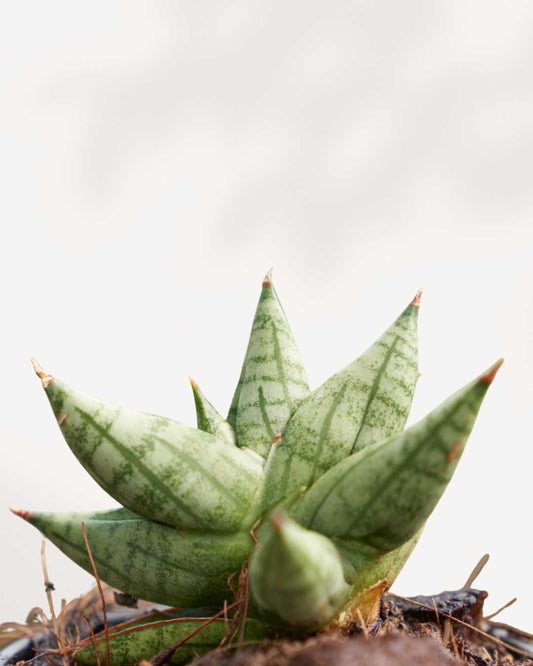 Sold out
Sold outSansevieria Ming Manee
Regular price $15Regular priceUnit price per -
Baltic Blue Pothos
Regular price $25Regular priceUnit price per
MyGreenScape is your go-to online shop for indoor plants in cities Ontario or Quebec, including Toronto, Montreal, and many more. Our mission is to add joy to your home, one leaf at a time. Explore our range of beautiful, air-cleaning plants from the comfort of your home. You can find beautiful indoor plants, pots for plants, garden tools, and hanging basket plants all in one spot. Our mission is to add joy to your home, one leaf at a time.
Buying plants online with us means no more carrying heavy pots or figuring out how to get big plants home. We deliver straight from the gardener to you, with eco-friendly packaging, across Ontario and Quebec. Expect your new green friends within 2-7 days.
Why choose MyGreenScape? Here’s why:
- Lifetime Support: We’re here for you always. Get all the help you need for your plants to flourish.
- 30-Day Happy Plant Guarantee: Not happy with your plant? Tell us within 30 days, and we’ll fix it.
- Easy Delivery: Fast, direct to your doorstep in Ontario or Quebec.
Hear from a happy customer, Sarah T.: "Buying plants was never easier. Quick, simple, and with great support from MyGreenscape."
Ready for easy, stress-free plant shopping? Visit us now and make your home greener. Join MyGreenScape for a hassle-free way to bring nature inside.


